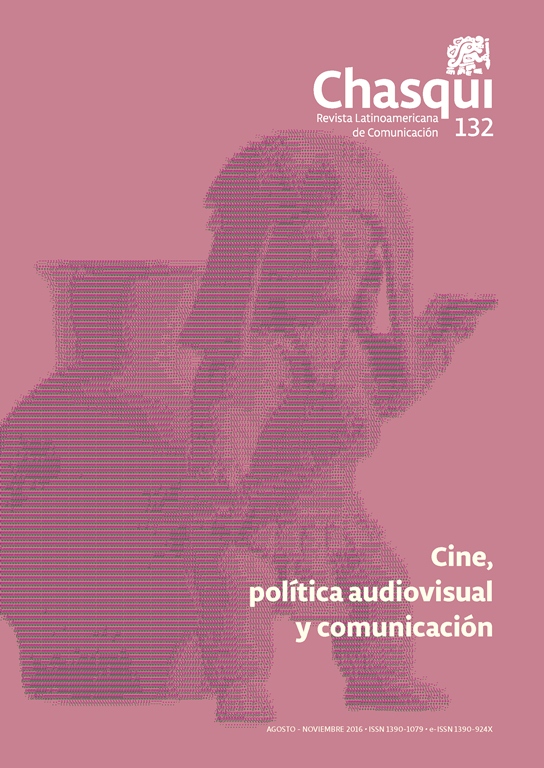The establishment of cyberpolitics: governance and code
DOI:
https://doi.org/10.16921/chasqui.v0i132.2480Keywords:
political philosophy, computer code, cyber-conservatism, cyberlibertarianismAbstract
This paper deals with the problem of politics in cyberspace. It deals with the hypothesis of a new and distinct institutional aspect that can be called “cyberpolitics”. This dimension is based on two founding forces: on one hand, the role of computer code in building the communicational network architecture (internet). On the other hand, the role of virtual communities as subjects that are constrained by this architecture but at the same time can modify it. These communities are organized by networked governance systems that make the cyber-political power horizontal, nevertheless they are no out of conflict.References
Assange, J.; Appelbaum, J.; Müller-Maguhn, A. & Zimmerman, J. (2012). Cypherpunks: Freedom and the Future of the Internet. Nueva York: OR Books.
Botsman, R. (2010). What’s Mine Is Yours: The Rise of Collaborative Consumption. Harper Business.
Gibson, W. (1984). Neuromancer. Nueva Jersey: Ace Books.
Goldsmith, J. & Wu, T. (2006). Who Controls the Internet? Illusions of a Borderless World. Nueva York: Oxford University Press.
Goodin, R.E.; Petit, P. & Pogge, T. (2007). A Companion to Contemporary Political Philosophy. Singapur: Blackwell.
Himanen, P. (2001). The Hacker Ethics and the Spirit of the Information Age. Londres: Random House.
Lessig, L. (2006). Code: version 2.0. Nueva York: Basic Books.
Loader, B.D. (Ed.). (1998). Cyberspace Divide: Equality, Agency and Policy in the Information Society. Londres-Nueva York: Routlegde.
Ludlow, P. (Ed.). (2001). Crypto Anarchy, Cyberstates and Pirate Utopias. Cambridge: The MIT Press.
Mueller, M. (2010). Networks and States: The Global Politics of Internet Governance. Cambridge: The MIT Press.
Mueller, M. (2006) The New Cyber-Conservatism: Goldsmith/Wu and the Premature Triumphalism of the Territorial Nation-State. Review of Goldsmith and Wu’s “Who Controls the Internet. Illusiones of a Borderless World”, Internet Governance Project. Disponible en http://bit.ly/2ervNpG.
Murray, A.D. (2007). The Regulation of Cyberspace: Control in the Online Environment. Abingdon: Routldege-Cavendish.
Raymond, E. (2001). The Cathedral and the Bazaar: Musings on Linux and Open Source by an Accidental Revolutionary. Cambridge: O’Reilly.
Tovey, M. (Ed.). (2008). Collective Intelligence: Creating a Prosperous World at Peace. Oakton, Virginia: Earth Intelligence Network.
Von Busch, O. & Palmås, K. (2006). Abstract Hacktivism: the Making of a Hacker Culture. Londres-Estambul: Bitstream Vera-Lightning Source.
Downloads
Published
Issue
Section
License
- Authors retain copyright and grant the journal right of first publication with the work simultaneously licensed under a Creative Commons Attribution-NoDerivs License (CC BY-ND) that allows others to share the work with an acknowledgement of the work's authorship and initial publication in this journal.
- Authors are able to enter into separate, additional contractual arrangements for the non-exclusive distribution of the journal's published version of the work (e.g., post it to an institutional repository or publish it in a book), with an acknowledgement of its initial publication in this journal.
- Authors are permitted and encouraged to post their work online.

